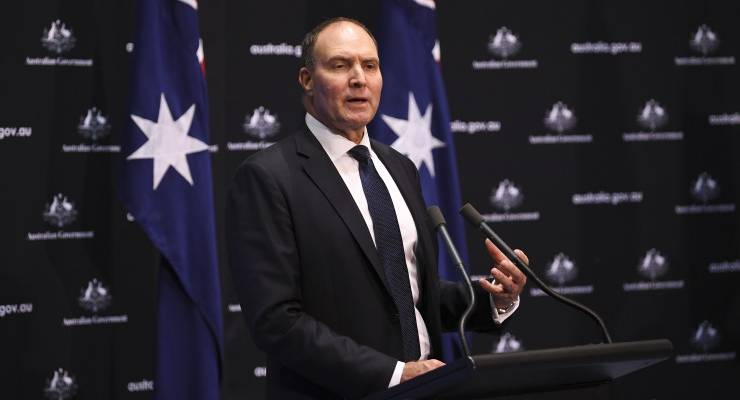
It’s been nearly two months since Scott Morrison unveiled his National COVID-19 Coordination Commission, a body staffed largely by business, public service and former political leaders, that was intended to plan Australia’s pandemic recovery.
But since then, it’s not entirely clear what the commission has actually done. Instead, it’s faced scrutiny over a lack of transparency, and apparent promotion of business interests.
Who’s on the commission?
Lots of well-connected people from the corporate sector, but very little health experience. The commissioners are:
- Nev Power (chair): Former CEO and managing director of Fortescue Metals Group, current Perth Airport chairman
- David Thodey (deputy chair): Ex-Telstra CEO
- Greg Combet: Former ACTU boss and minister in the Rudd-Gillard governments
- Jane Halton: Former secretary of the finance and health departments. On the board of Clayton Utz, Crown Resorts and ANZ
- Paul Little: Former head of transport and logistics company Toll Group
- Catherine Tanna: Managing director of Energy Australia
- Peter Harris (CEO): Former head of the Productivity Commission and career public servant
- Andrew Liveris (special adviser): Former chairman and CEO of Dow Chemical. On the board of, among others, the Saudi Arabian Oil Company (Saudi Aramco).
A gassy future?
What has the commission done so far? The “news” section on its website contains just five items, including a planning tool for businesses to work safely.
But some of its more recent public announcements might raise a few more eyebrows.
This week, the commission has been trumpeting a $6 billion trans-Australian gas pipeline. A story in today’s Australian Financial Review, quoting Power, suggests cheap gas will be a key pillar of the Morrison government’s economic recovery. It isn’t the first time Power has pointed to gas as an economic solution. He’s also promoted fertiliser and petrochemicals as industries that Australia can take advantage of.
But while Power claimed the commission was transparent about its interests, it’s clear plenty of them would benefit from a gas-driven future.
Power is on the board of Strike Energy, a gas field developer run by a close friend. One of the big projects getting early backing from Power and the commission was an ammonia plant in Narrabri, NSW, which could pave the way for a controversial Santos gas project.
Those gas ties run through the commission — for example, Catherine Tanna heads Energy Australia. But those interests are perhaps best represented by Andrew Liveris. A special adviser, Liveris wasn’t one of the initial commissioners. It’s unclear how he came on board, but it was reportedly through Power.
“Petrochemicals should be a no-brainer for this country,” Liveris said following his appointment last month.
Saudi Aramco, where Liveris is a board member, sees a hugely profitable future in natural gas production. And Dow Chemical, which he used to head, is one of the world’s leading fertiliser producers. Liveris is also on the board of Worley Parsons, an consultancy for the energy and gas industries.
It’s also worth noting what the commission hasn’t prioritised. Power has said debates about climate change could wait till after the crisis, and appeared to downplay renewable energy in his response to the crisis.
Conflicts won’t be exposed
There is, however, still very little we know about the commission. Last week, the Department of Prime Minister and Cabinet told Senate estimates Power would be paid $267,345 (less than original figure of $500,000) for six months of work. That money wouldn’t be a salary, but is intended to cover costs of travel and accommodation.
Combet, Halton and Little would each be paid $108,000 for two days a week for six months.
There’s also a lack of clarity about how future potential conflicts of interest would be addressed. Harris said the commission had processes in place for dealing with conflicts of interest, but rejected a call to publicly disclose them.
And any process of declaring conflicts wouldn’t apply to Liveris, since he is classed as an appendage to the commission, Senate estimates heard last week.








How would a gas pipeline from Western Australia to the eastern states reduce gas prices?
Surely it would be snapped up by gas exporters?
Why is Greg Combet referred to as an ACTU Boss? Jane Halton could be listed as a former boss of the Health department. Why are union officials always described as bosses by the media?
Jane Halton of the ‘I don’t remember’ faulty memory fame?
Or Jane Halton for her starring role in the “Children overboard” story. A picture of integrity.
“Racist liar”. Fixed it for you.
That dramatis personae is quite the rogues’ list of the usual suspects and absolutely no conflicts of interest.
Nice touch to include Combey. For…balance?
Wasn’t Greg Combey a big supporter of action on climate change? How is that going to work on this ‘commission’ of climate deniers/fossil fuel supporters?
Or has he changed his stripes to accommodate this appointment??
It happens.
Principles, as Groucho pointed out & Ma’n Fer’son demonstrated, are flexible and depend upon knowing who butters the cheque.
Why would Combet sign up to legitimise this gang’s activities?